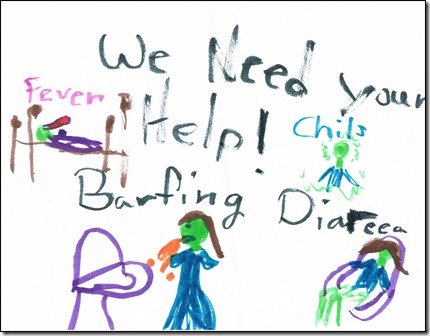 There was no secret about Sean. when Mr. Dickson took over the first-grade class after the original teacher had to leave for an operation, she had told him a little bit about every student. So he knew what to expect about Sean.
There was no secret about Sean. when Mr. Dickson took over the first-grade class after the original teacher had to leave for an operation, she had told him a little bit about every student. So he knew what to expect about Sean.And so did his mother. She telephoned me in tears about 3 weeks after Miss Maclean left and Mr. Dickson took over. Sean was saying he was sick every morning, didn’t want to go to school At the same time, Mr. Dickson had called her about every other day, complaining about Sean’s behavior. He wasn’t getting into fights, wasn’t hurting anything or anybody, but was spending a lot of the time joking with his friends, making silly noises when the teacher’s back was turned, making silly drawings, writing silly notes, and basically just being silly. He is very fidgety, and never sat still on his chair. This was, if anything, getting worse. It was becoming a real management problem for Mr. Dickson in the classroom. During the most recent phone call from him, he suggested that Sean might benefit from ADHD medication and urged an ADHD evaluation, as he put it, ‘ASAP.’
Sean’s mother, perhaps feeling a little defensive, asked Dickson why he thought it might be that for the first half of the school year she had not received a single phone call about her son, but since he took over, she’s had at least 10. Maybe, she suggested, he was not doing something that Maclean had been doing, or wasn’t doing something she used to do.
I asked her some neutral but important questions. Was he doing his assignments? Was he handing them in? How did he do on quizzes? How did he get along with the other students? Did he get in trouble during recess when he was running around outside? Were any of his standardized test scores available? She told me that he was popular and had lots of friends, all his assignments were up to date and he seemed to breeze through his homework, which seems completely unchallenging to him. His standardized test scores put him fully a grade-level ahead of where he was. when mom asked him why he talks in class, and why he gets in trouble, he says that he’s bored.
She told his teacher, Mr. Dickson, that Sean says he’s bored. He responded that there was no way to manage a classroom full of first-graders if some students were off doing stuff on their own. He went on to note that Sean seemed particularly unimpressed by the loss of certain privileges in the classroom. He asked for advice on how to ‘control’ him until he starts taking ADHD medication. This was all quite upsetting for Sean’s mom, so she telephoned me.
I have been Sean’s doctor since he was born. I have been the doctor of Sean’s 3 older siblings since they were born. I have been to his home many times for house calls. His family is intact and loving, but with 3 older siblings, there’s no point in getting too attached to any particular toys or objects--the whole concept of ownership has to be flexible. At home, all the kids play with all the toys. For Sean in particular, who has never been a materialistic kid, this weak attachment to things makes them poor tools for discipline. His parents have mentioned to me that taking away his access to any particular toy just isn’t an effective way for them to get their point across.
Having been the doctor for him and his siblings for many years, and coincidentally having some expertise in ADHD and child behavior, I didn’t hesitate bringing these issues up to his parents when they became obvious in my office some years ago. I asked his mom if she thought he was more active that his 3 siblings. I already knew that he interrupted a lot, couldn’t sit still, seemed always to be in motion. So I don’t think that mom was insulted, exactly, when Dickson brought up ADHD. I had brought it up to her years earlier. But I thought she was right to mention that this wasn’t a problem until the new teacher showed up.
So I thought Sean was a little hyperactive, had some impulse control issues, was often interrupting and talkative. That does indeed sound like ADHD. But he had some important compensatory skills. He was very intelligent, and had excellent reading ability, a good vocabulary, and could speak in a surprisingly articulate way. He was also funny and warm and the only people he had occasional fights with were his siblings. Because of these positive traits, he had friends at school and did well in his schoolwork. Sure, he had an attention-deficit. He had hyperactivity. (That’s ‘ADH’ if you’re keeping track.) But the ‘D’ for disorder didn’t really start until the new teacher started.
As I have written before, this is an essential part of the diagnosis. Just because you might have every other trait associated with ADHD doesn’t mean you need to be on medication for it. If, on the other hand, your life is crumbling, is it because of the ADHD or something else going on in your life? Maybe a new teacher in the middle of the year?
Among the most important skills for a doctor is listening. There was one important person I had not heard from yet.
Sean could not sit still. He made good eye contact when he was speaking to me, but not as good when I was speaking to him. When we were talking, he had no problem staying on his chair. His answers to my questions were completely focused and appropriate. But he was a little fidgety. When I asked him why things were different with Mr. Dickson--something he said that no one else had asked him--he told me. He said that Miss Maclean had let him get up from his chair and go to the back of the room and work on stuff when he got bored. Mr. Dickson not only doesn’t allow that, but enforces infractions of his classroom rules by taking things and privileges away from Sean. According to Sean, this doesn’t make him angry, it just confuses him. He didn’t understand why his teacher would take away stuff that he didn’t really care about. It’s true he joked around a lot in class, and he knows that he’s not supposed to, but class is so boring for him when he often has nothing to do. He usually finished his classwork early and it was hard for him to sit with nothing to do as he waited for the rest of the class to catch up. He got in trouble for getting up out of his seat, for looking for something to keep himself busy. He repeated the definition to me, together with his conclusion. “I don’t like being bored.”
Who does? In the next post, I propose an intervention.












